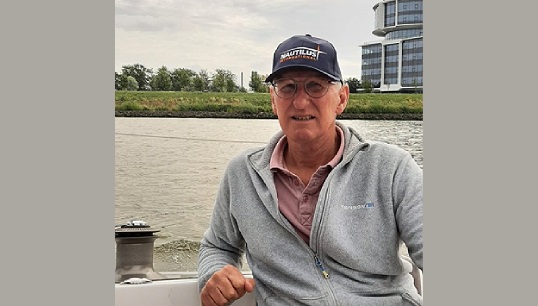- Topics
- Campaigning
- Careers
- Colleges
- Community
- Education and training
- Environment
- Equality
- Federation
- General secretary message
- Government
- Health and safety
- History
- Industrial
- International
- Law
- Members at work
- Nautilus news
- Nautilus partnerships
- Netherlands
- Open days
- Opinion
- Organising
- Podcasts from Nautilus
- Sponsored content
- Switzerland
- Technology
- Ukraine
- United Kingdom
- Welfare
An unconventional career: from coffee and tobacco processing to canal lock operator
18 April 2024

Dutch bridge and lock operator Sieto de Vries, from Joure, is a staunch unionist and Nautilus Council member. He explains his unconventional career journey from the tobacco and coffee processing industries to a nautical role on canals in the Netherlands.
What is your job title?
Bridge and lock operator.
What originally attracted you to a career in maritime?
Unlike many Nautilus members, my nautical background is mainly based on a passion for water sports. Until 2014, my nautical training was mainly focused on boating licences, theoretical coastal navigation, a maritime radio certificate, safety and rescue, and sailing on open water. My wife and I own a Spirit 36 sailing yacht, on which we have sailed to the UK three times.
What did you do in your career before joining the maritime sector?
After finishing school, I joined a sail making workshop in Grou, then did my military service, but I saw few [job] prospects after my return. So, I started work at what was then the Tobacco Packaging Company of Douwe Egberts (DE) in Drachten on 1 January 1980. This was the period when the FNV union became known through national strikes against the abolition of 'automatic price compensation'. The level of organisation at DE was also high at that time and I became a member of FNV. After seven pleasurable years working in Drachten, it was time to take on new challenges within the DE company. I spent the next 28 years working at the DE Moccona factory in Joure, where liquid and instant coffee is still produced for worldwide consumption. That job ended on September 30, 2014, when I was 57 years old, due to a reorganisation within the company.
Stopping work was not an option for me and I ended up at ODV-Maritiem [a Dutch maritime personnel provider]. I joined them after successfully completing NNVO nautical training courses during the winter season.
What sort of jobs, challenges and highlights have you had in your shoreside nautical career?
I have worked with Rijkswaterstaat [a Dutch government agency protecting citizens from flooding], specifically on the Houtrib lock complex on Lake IJssel, and all locally operated bridges in the Frisian section of the main waterway of the Lemmer-Delfzijl Main Waterway (HLD) [a route for freight transport and recreational boating through the northern Netherlands].
I also worked in the province of Flevoland, where I was the first operator at the port control center in the city of Lelystad, which is popular with pleasure boaters. Since I am not unfamiliar with inland shipping, this branch of the service was my preference. Pleasure boating has its peak in the summer months, with many less experienced skippers. I have experienced many beautiful – and less beautiful – situations and, most importantly, I have seen them coming!
How did you become a member of Nautilus?
This was a golden opportunity for me. Due to being a trade union executive during my time at DE, then FNV union director for DE, I was advised to join Nautilus as the transboundary maritime union covering crew and shoreside workers in inland waterways in the Netherlands and Switzerland. I feel like 'a fish in water' within this group! I hope that as a Nautilus Council member I will now provide good added value to members.
Tags
